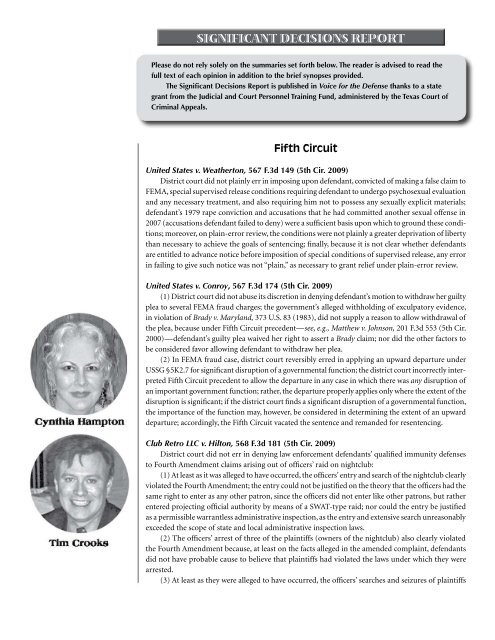⢠'-Oft! - Voice For The Defense Online
⢠'-Oft! - Voice For The Defense Online
⢠'-Oft! - Voice For The Defense Online
Create successful ePaper yourself
Turn your PDF publications into a flip-book with our unique Google optimized e-Paper software.
Significant Decisions Report<br />
Please do not rely solely on the summaries set forth below. <strong>The</strong> reader is advised to read the<br />
full text of each opinion in addition to the brief synopses provided.<br />
<strong>The</strong> Significant Decisions Report is published in <strong>Voice</strong> for the <strong>Defense</strong> thanks to a state<br />
grant from the Judicial and Court Personnel Training Fund, administered by the Texas Court of<br />
Criminal Appeals.<br />
Fifth Circuit<br />
United States v. Weatherton, 567 F.3d 149 (5th Cir. 2009)<br />
District court did not plainly err in imposing upon defendant, convicted of making a false claim to<br />
FEMA, special supervised release conditions requiring defendant to undergo psychosexual evaluation<br />
and any necessary treatment, and also requiring him not to possess any sexually explicit materials;<br />
defendant’s 1979 rape conviction and accusations that he had committed another sexual offense in<br />
2007 (accusations defendant failed to deny) were a sufficient basis upon which to ground these conditions;<br />
moreover, on plain-error review, the conditions were not plainly a greater deprivation of liberty<br />
than necessary to achieve the goals of sentencing; finally, because it is not clear whether defendants<br />
are entitled to advance notice before imposition of special conditions of supervised release, any error<br />
in failing to give such notice was not “plain,” as necessary to grant relief under plain-error review.<br />
Cynthia Hampton<br />
Tim Crooks<br />
United States v. Conroy, 567 F.3d 174 (5th Cir. 2009)<br />
(1) District court did not abuse its discretion in denying defendant’s motion to withdraw her guilty<br />
plea to several FEMA fraud charges; the government’s alleged withholding of exculpatory evidence,<br />
in violation of Brady v. Maryland, 373 U.S. 83 (1983), did not supply a reason to allow withdrawal of<br />
the plea, because under Fifth Circuit precedent—see, e.g., Matthew v. Johnson, 201 F.3d 553 (5th Cir.<br />
2000)—defendant’s guilty plea waived her right to assert a Brady claim; nor did the other factors to<br />
be considered favor allowing defendant to withdraw her plea.<br />
(2) In FEMA fraud case, district court reversibly erred in applying an upward departure under<br />
USSG §5K2.7 for significant disruption of a governmental function; the district court incorrectly interpreted<br />
Fifth Circuit precedent to allow the departure in any case in which there was any disruption of<br />
an important government function; rather, the departure properly applies only where the extent of the<br />
disruption is significant; if the district court finds a significant disruption of a governmental func tion,<br />
the importance of the function may, however, be considered in determining the extent of an upward<br />
departure; accordingly, the Fifth Circuit vacated the sentence and remanded for resentencing.<br />
Club Retro LLC v. Hilton, 568 F.3d 181 (5th Cir. 2009)<br />
District court did not err in denying law enforcement defendants’ qualified immunity defenses<br />
to Fourth Amendment claims arising out of officers’ raid on nightclub:<br />
(1) At least as it was alleged to have occurred, the officers’ entry and search of the nightclub clearly<br />
violated the Fourth Amendment; the entry could not be justified on the theory that the officers had the<br />
same right to enter as any other patron, since the officers did not enter like other patrons, but rather<br />
en tered projecting official authority by means of a SWAT-type raid; nor could the entry be justified<br />
as a permissible warrantless administrative inspection, as the entry and extensive search unreasonably<br />
ex ceeded the scope of state and local administrative inspection laws.<br />
(2) <strong>The</strong> officers’ arrest of three of the plaintiffs (owners of the nightclub) also clearly violated<br />
the Fourth Amendment because, at least on the facts alleged in the amended complaint, defendants<br />
did not have probable cause to believe that plaintiffs had violated the laws under which they were<br />
arrested.<br />
(3) At least as they were alleged to have occurred, the officers’ searches and seizures of plaintiffs

















